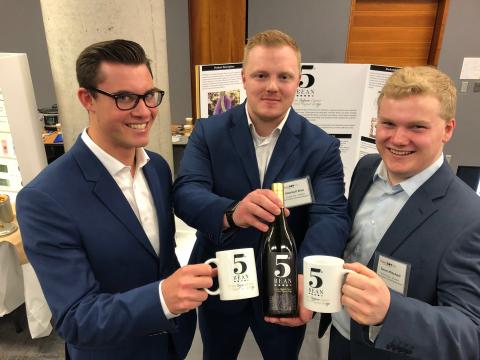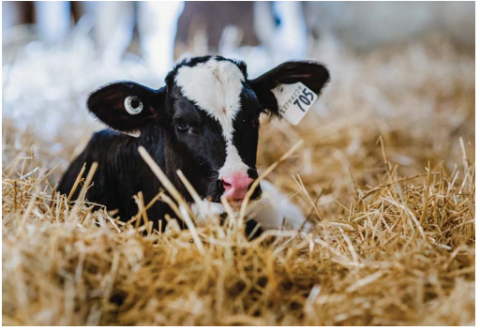- About the Office of Research
- Welcome Message
- Meet the Vice-President (Research)
- Strategic Research Plan
- Mission Statement
- Services and Divisions
- Discover our Research
- Research Chairs
- Facts and Figures
- Centres, Institutes, and Groups
- International Research
- Find a Researcher
- For Researchers
- Safeguarding Research
- Commercialization Policy and Framework
- Equity, Diversity, and Inclusion in Research
- Research Alerts
- Funding
- Ethics and Regulatory Compliance
- Research Integrity and Conflict of Interest
- Patenting, Licensing, and Commercialization
- Honours and Awards
- Ontario Agri-Food Innovation Alliance
- Other Considerations and Resources
- Forms, Policies, Guidelines, and Procedures
- Interactive Support Sessions for Researchers
- Research Administration Information Management System (RAIMS)
U of G pet nutrition expert receives research excellence award

Dr. Adronie Verbrugghe demonstrates how to check pet body composition score with DVM students.
An Ontario Veterinary College (OVC) researcher, who specializes in pet nutrition, has been recognized for research excellence and innovation.
Dr. Adronie Verbrugghe, a professor in OVC’s Department of Clinical Studies, has received a Research Excellence Award from the University of Guelph. Professor Verbrugghe, who is also Royal Canin Veterinary Diet Endowed Chair in Canine and Feline Clinical Nutrition, focuses her research on canine and feline nutrition.
“The impact of nutrition on health is a crucial, incredibly timely area of research,...
Open Access

By Amber Wood
Open Access, a free and unlimited online access framework to scholarly publications, is a way by which to improve knowledge, accelerate discovery and encourage innovation.
In May 2015, Canada introduced the Tri-Agency Open Access Policy on publications to mandate open access to research articles funded by Canada's three major research agencies: the Natural Sciences and Engineering Research Council (NSERC), the Social Sciences and Humanities Research Council (SSHRC) and the Canadian Institutes of Health Research (CIHR).
...
Predatory journals

istock.com/serdjophoto
By Amber Wood
As predatory journals become increasingly common in the scholarly publishing landscape, major media outlets like CBC and CTV News have broadcasted cautionary tales to researchers.
The growing concern with predatory journals is that they do not reflect the quality present in the scholarly publishing landscape and can be exploitive of researchers. Predatory publishers exploit the author-pays business model for their own profit. They conduct little to no peer review or editing work thereby hindering the scientific process and...
Vegan liqueur, skin exfoliant and aluminum foil substitute win big in Project SOY

Vegan liqueur, skin exfoliant and aluminum foil substitute win big in Project SOY
A cream liqueur for vegan- and lactose-intolerant consumers, a soybean-based skin exfoliant and edible soy protein substitute for aluminum foil are this year’s first-place projects at the University of Guelph’s 23rd annual Project SOY competition.
Project SOY (Soybean Opportunities for Youth) is an annual contest that harnesses students' creative power to develop new products and marketing strategies for soybeans. The event, held at the...
Dairy Performance Related to Calf Health

Photo courtesy of Caitlin MacLeod
Dairy performance related to calf health
By Alicia Bowland
Poor lung health in calves implicated in long-term negative impacts to dairy production. To maximize productivity and profitability, and to facilitate managerial decision-making, dairy producers need to look at their calves’ lung health. Tricia Dunn, graduate from the department of population medicine at the University of Guelph, and Theresa Olivett from the University of Wisconsin School of Veterinary Medicine used thoracic ultrasound technology, a non-invasive chest ultrasound, to analyze...
U of G-Led Network Gets $2 Million to Link Cultural Researchers

Prof. Susan Brown
U of G-Led Network Gets $2 Million to Link Cultural Researchers
By Owen Roberts
A unique University of Guelph-based network designed to enhance the usefulness of online materials in cultural research has received a $2-million grant from the Canada Foundation for Innovation (CFI). The Linked Infrastructure for Networked Cultural Scholarship (LINCS) project is led by Susan Brown, a professor in the School of English and Theatre Studies and Canada Research Chair in Collaborative Digital Scholarship.
Read more: ...
The next frontier

Soil sampling in the field. Photo Courtesy of Laura Van Eerd.
The next frontier
By Owen Roberts
THE RELATIONSHIP BETWEEN agriculture and food is a natural one — at least for producers, who nurture it daily. But the agri-food connection is increasingly becoming a “eureka moment” for the public, too. People are waking up to the realization that agriculture precedes food, and that what they see on their plate comes from complex agri-food systems. As they dig deeper into food production, they’re realizing these agri-food systems depend to a great degree on soil health and preservation.
...
Movember has meaning for canines, too

MSc student Charly McKenna (left) and Dr. Tony Mutsaers (right) are photographed with prostate cancer patient Alfred. Photo: Karen Mantel
New gold nanoparticle cancer therapy technique could help animals and humans
By Samantha McReavy
Canine prostate cancer research at the University of Guelph could help transform future cancer treatments – for pets and humans – making therapy less invasive and more effective.
Researchers are working to determine the efficacy of a new gold nanoparticle cancer therapy technique for dogs with prostate tumours. University of Guelph professor Dr. Tony Mutsaers, Department of Clinical Studies and Department of Biomedical Sciences is involved in...
Fake goods darken Black Friday

When it's being worn, who knows it's a fake? Photo: Owen Roberts
By Owen Roberts and Ariana Longley
One of North America’s biggest shopping days, Black Friday, has arrived -- November 23, the day after Thanksgiving Day in the US.
Since the 1980s, Black Friday has taken conspicuous consumption to the max. It started out innocent enough, with retailers offering super prices to kick start the Christmas shopping season.
But it’s brought out the worst in consumer behaviour, with shoppers lining up hours before stores open, then trampling each other to get to a deal. Most lately its spawned Cyber Monday, its...
3-D printed cat skull helps budding vets learn new skills

PhD engineering student Claudia Smith is pictured here with her 3-D printed cat intubation model. Photo: Karen Mantel, OVC
By Sydney Pearce
When engineering meets veterinary science at the U of G, dozens of practice models are developed for learning companion animal medical procedures.
One such model is a 3D-printed model of a cat that permits students to practice tracheal intubation, a procedure that allows (or permits) the delivery of anesthetics and oxygen to the lungs through a tracheal tube.
Many commonly used 3D printers only allow the use of hard plastics. But Claudia Smith, a PhD student from the School of Engineering, infused a variety of soft...
Who We Are
The Office of Research oversees a $186 million research enterprise across seven colleges, our regional campus at Ridgetown, 15 research centres, and the University of Guelph/Ontario Ministry of Agriculture, Food and Rural Affairs Agreement. We are committed to supporting the research programs of University of Guelph faculty across all disciplines.